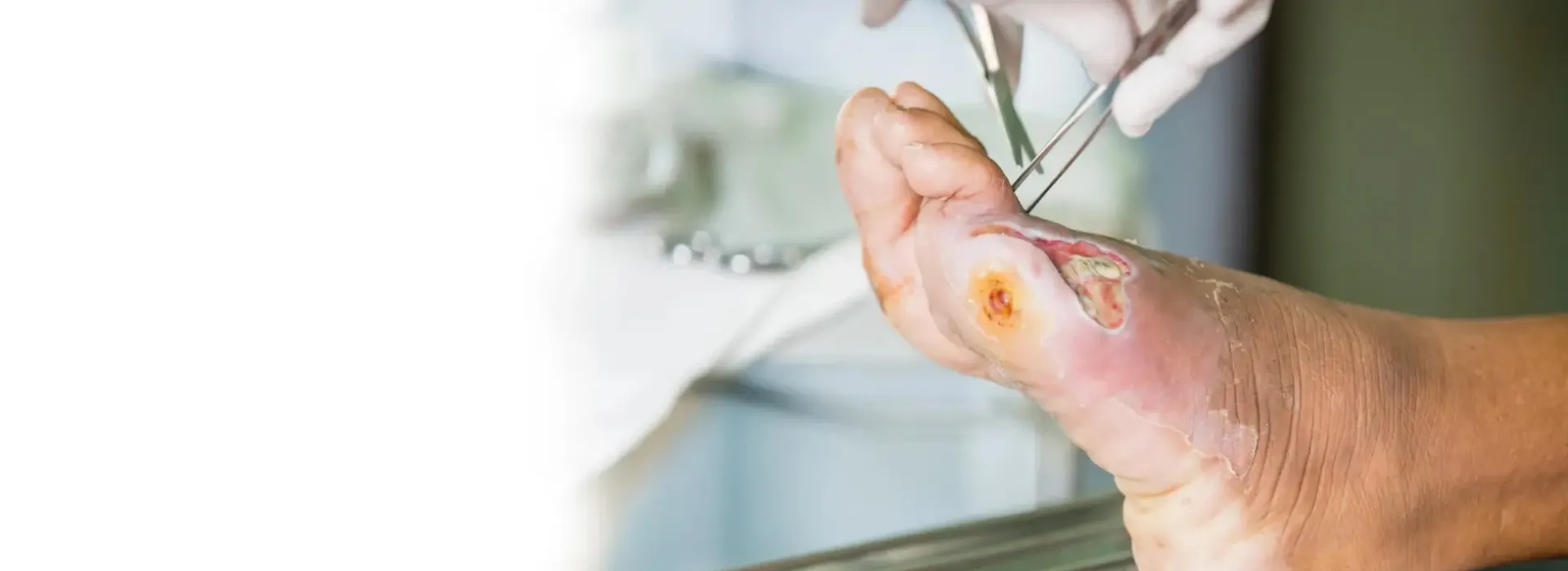- Home
- Robotic Knee Surgery
- General Surgery
- Orthopaedic
- Other Specialities
- About us
- Blogs
- Contact
24 Hours Accident, Trauma & Other Emergency Services . . .
Get in Touch
X

Non Healing Wounds Treatment in
Mumbai, India | Non Healing Foot Ulcer
- Home
- Diabetic Wound Care
- NON-HEALING WOUNDS
- Non-Healing Wounds Treatment
- Types of Wound Dressings
- Who is At Risk?
- Symptoms
- Wound Care Treatment
- Prevention
Non-Healing Wounds Treatment Centre in Goregaon, Mumbai
A wound is considered as an injury caused by a cut, blow, or an impact that breaks or punctures the skin graft or living tissue. Skin is a protective organ in the human body and its principal job is to operate as a barrier that serves three purposes: protection, regulation, and sensation. A wound is the result of a failure in the skin's protective function.
Non-healing wounds are those wounds that don’t heal in three to five weeks even after proper treatment and care under a doctor’s supervision. There are a wide range of factors that cause non-healing wounds such as infections, metabolic reasons, immunosuppression conditions, ischemia etc.
If you are someone who is suffering from non-healing chronic wounds, visit Kapadia Hospital is the Best Wound Treatment clinic in Goregaon, Mumbai. From treating leg ulcers caused by diabetes to chronic non-healing wounds, the team of experts offer holistic care for all.
Types of Wound Dressings
The aetiology, location, depth, tissue loss, clinical appearance, kind of injury or symptoms, can all be used to classify the type of wound dressings required by the patient. At Kapadia Hospital, advanced and unique grading tools are used for the treatment of leg ulcers in the elderly and non-healing wound of the foot.
The highly skilled medical staff divides non-healing Diabetic Foot Ulcers and wounds into the following categories based on the extent of contamination:
-
Clean wound
Created under sterile conditions without organisms or complications hindering the healing process.
-
Contaminated wound
Usually caused by an accidental injury and containing infectious organisms and foreign substances.
-
Infected wound
It has pathogenic organisms present and proliferating, causing discomfort, redness, seeping pus, and other clinical indicators of infection.
-
Colonized wound
A long-term condition characterised by pathogenic organisms, a difficult-to-heal wound bed, and persistent discomfort.
Who is At Risk?
It is critical to see a doctor urgently to get the best Non Healing Wound Treatment or Non Healing Ulcer Treatment. Many people are at risk of developing a non-healing diabetic foot ulcer or wound that does not heal. It includes individual those who have:
- Long-term medical issues such as diabetes, anemia, cancer, and others.
- Heart-related disease, hypertension, or venous insufficiency.
- Unhealthy habits such as smoking, consuming a poor diet, and not exercising.
- Chemotherapy, immunosuppressive medicines, or medical diseases like AIDS have weakened the immune system.
- Ulcers in the past.
- Those are being confined to a wheelchair or a bed.
Symptoms
If you notice any of the following symptoms, consult best wound care doctors in Mumbai at Kapadia Hospital. Get treatment for non-healing leg ulcer treatment and non-healing wound treatment:
- Extreme pain in the wound portion.
- A dark or blue colour around the wound's edges.
- Pus draining or leaking excessively.
- Soreness or redness going beyond the wound area.
- Foul-smelling wound.
Chronic Wound Care Treatment in Goregaon, Mumbai
Kapadia Hospital in Goregaon, Mumbai is equipped with the most advanced equipment for laser debridement and ultrasonic debridement for non-healing diabetic foot ulcers treatment. TCOM is utilised for non-healing leg ulcer treatment to check the oxygen level and treat chronic and complex diabetic wounds, as well as other issue wounds, using a hyperbaric oxygen chamber (HBOT).
At our Kapadia Hospital, we follow a step-by-step approach for the wound care treatment caused by leg ulcer.
-
Wound cleansing
Using soap, water, regular saline, Hibiclens solution or non-cytotoxic wound cleaners to clean the wound and peri-wound area.
-
Wound debridement
This can be done mechanically, sharply, enzymatically, or with autolytic and maggots.
-
Wound infection control
With a main or secondary dressing, medication is applied to the wound.
-
Wound edema control
Compression can be achieved with the use of an ace bandage, stockings, casts, or Una boots.
-
Wound off-loading
Splints, casts, crutches, and half-shoes may be prescribed to reduce the risk of recurrent injury.
Non-healing lesions are common among diabetics and necessitate rapid medical intervention. Both non-healing wound treatment and non-healing ulcer treatment at Kapadia Hospital are therefore conducted by the highly-qualified and experienced podiatrists and using the advanced and latest equipment for diabetic foot care at the most reasonable rates.
The Team of Doctors may also advise antibiotics for non-healing wounds.
Schedule an appointment with our skilled doctors today at our Diabetic Foot and Wound Centre in Mumbai.
Prevention
If you or someone you care about is at risk of having non-healing wounds, talk to the experts at Kapadia Hospital for prevention tips. The doctor may advise:
- Staying away from hot water, fire, sharp objects, and other dangers.
- Getting as much exercise as possible to avoid poor circulation.
- Regularly inspecting your body for sores.
- Eating a balanced diet for smooth blood flow.
- If you're overweight, lose weight.
- Maintaining good hygiene and skincare routines.
- If you smoke, you should quit.
- Using first aid to treat wounds as soon as possible.
- Examine if there are cuts, blisters, and other problems with your feet.
- Wash and keep your feet safe from harm.
If your wound does not heal on its own after three weeks, get urgent medical attention from our specialists at Kapadia Hospital. Get the best treatment for non-healing wounds and non-healing diabetic foot ulcers.
The team of wound care specialists with advanced training in non-healing wound treatment and non-healing Diabetic foot ulcers will help you heal faster and improve the quality of life.
